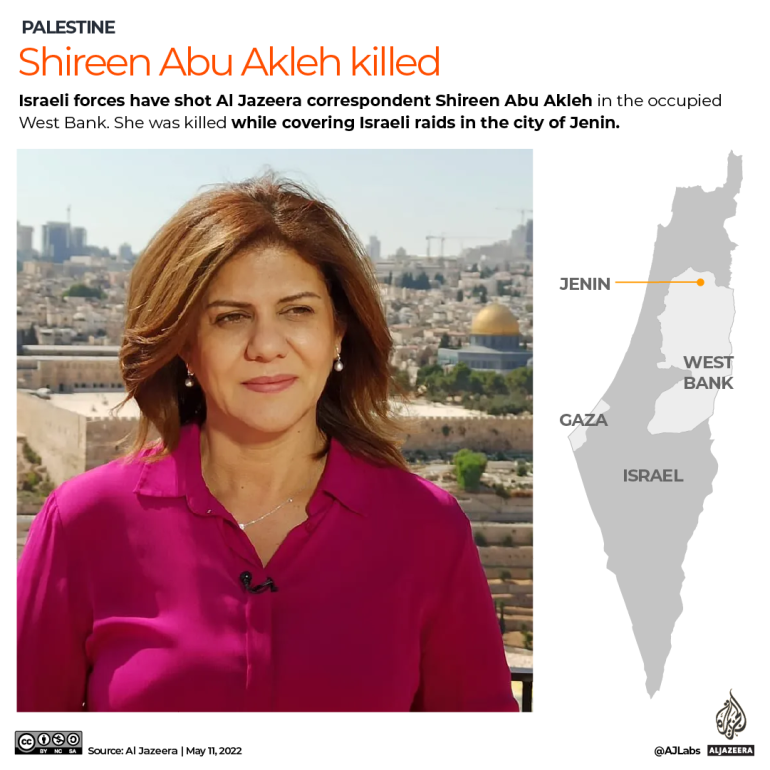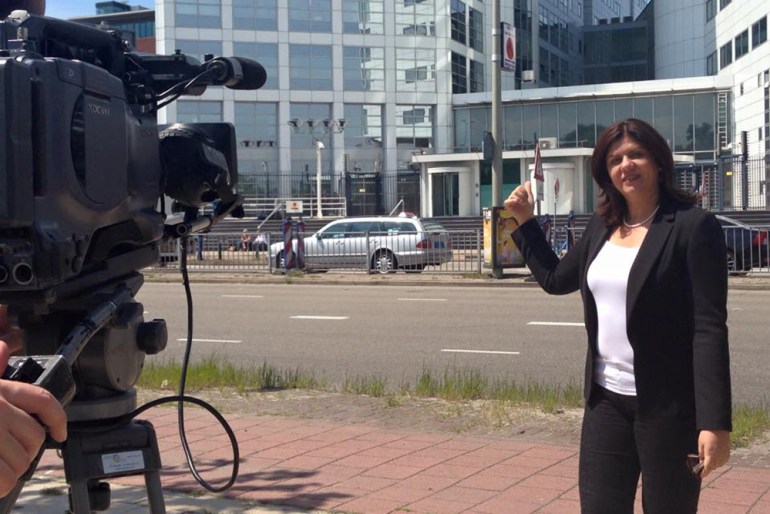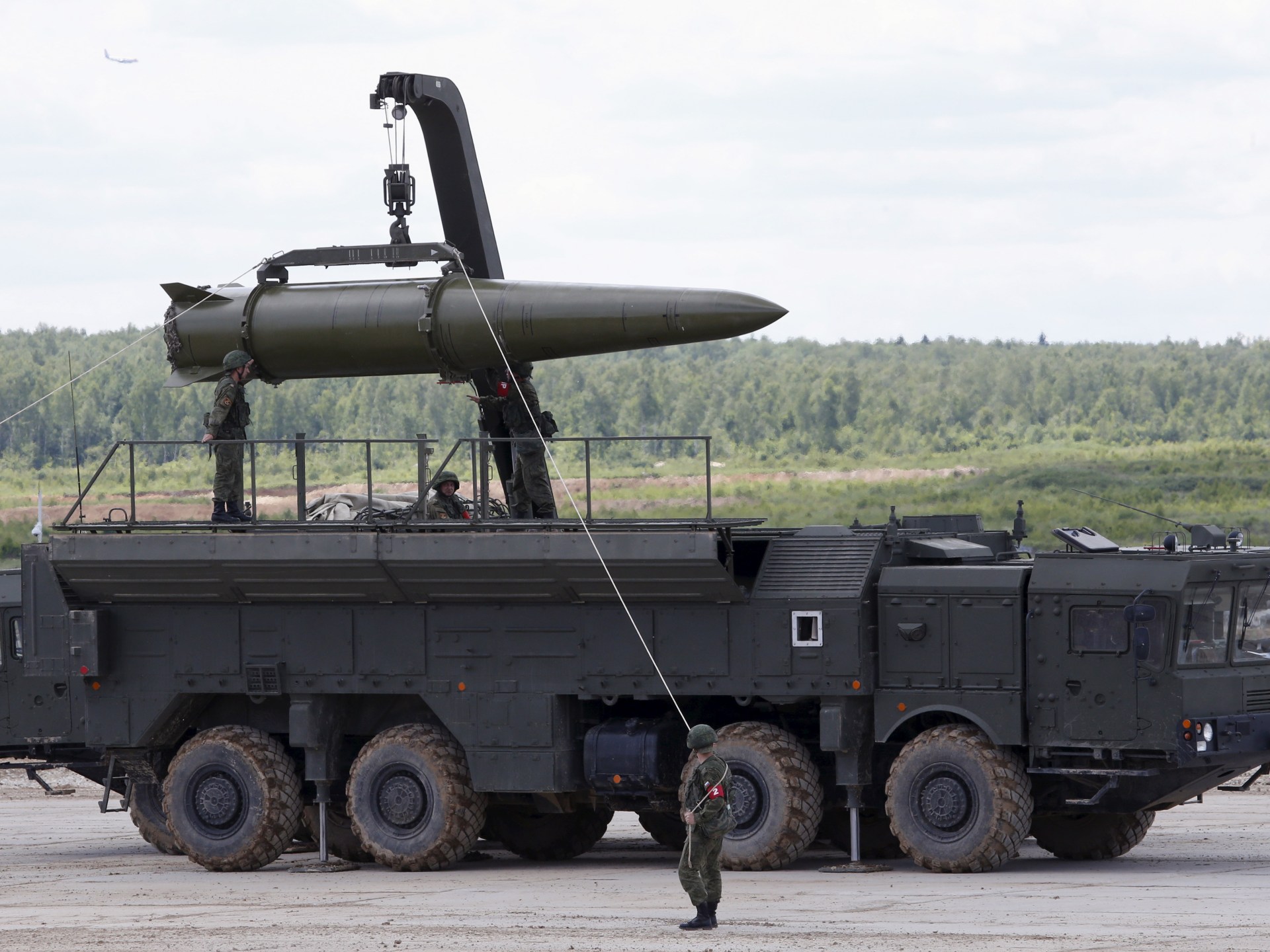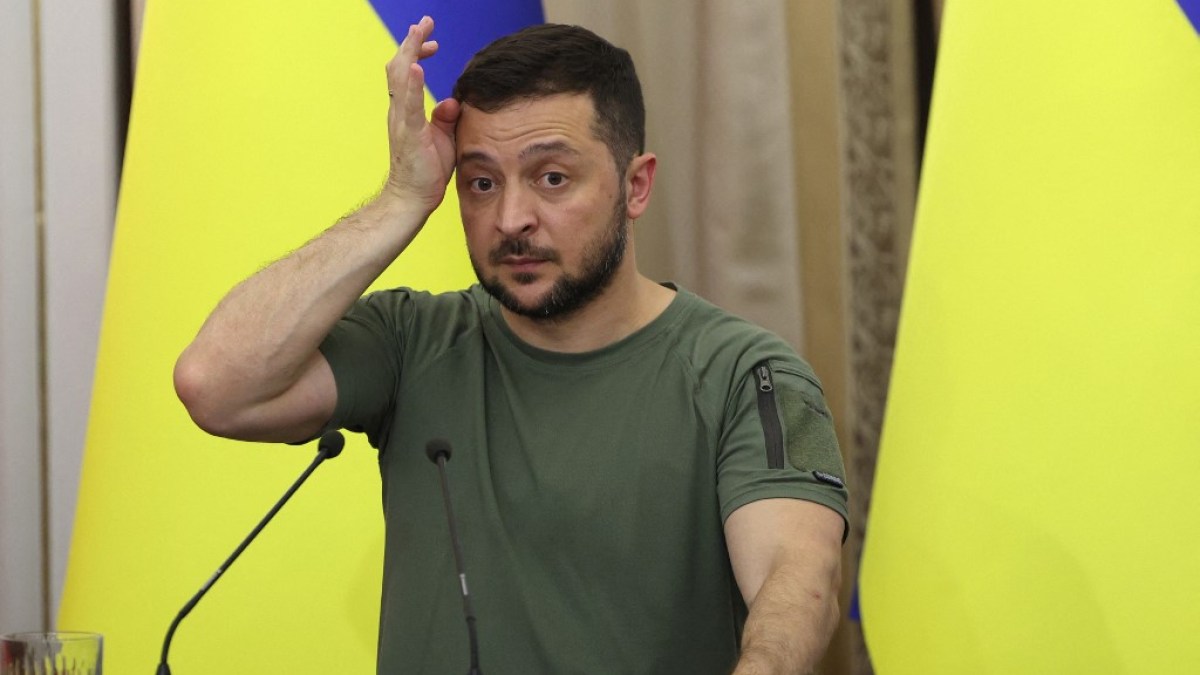Abu Akleh’s killing highlights Israeli attacks on journalists
The killing of Al Jazeera journalist Shireen Abu Akleh by Israeli forces in the occupied West Bank has cast a spotlight on the high rate of Israeli attacks against media workers, particularly Palestinians, and the relative impunity under which they operate, according to local journalists, advocates and rights groups.
Abu Akleh, 51, was fatally shot in the face on Wednesday while covering Israeli raids in the city of Jenin.
Palestinian authorities said the veteran journalist was shot by Israeli forces. Israel offered to conduct a joint investigation with Palestinian authorities, but its military has sought to cast doubt on who was responsible, saying Abu Akleh was shot during an exchange of gunfire and may have been killed by Palestinian gunmen. Palestinian authorities have rejected a joint investigation.
Journalists on the scene, including Shatha Hanaysha, who was also wounded in the incident, have rejected that narrative, saying Abu Akleh was in an “exposed area” with three other journalists when they were fired upon and that “there were no confrontations or shots being fired by Palestinian fighters”.
Journalists and advocates said the early version of events from the Israeli military indicates that it is unlikely its forces will be held accountable for the killing.

“I would say I have little to no confidence [in the investigation],” Yumna Patel, director of Palestine news for Mondoweiss, told Al Jazeera.
“Time and time again. It has been shown that Israeli forces kill Palestinians, including Palestinian journalists, without cause in the occupied territories and it’s very extremely rare that Israeli soldiers, captains or military officials are ever held accountable for their actions,” she said.
Speaking to Al Jazeera on Wednesday, Omar Shakir, Israel and Palestine director for Human Rights Watch, said the organisation is looking into the killing of Abu Akleh, but decried Israeli investigations “as whitewashed mechanisms”.
“That is the assessment that’s been reached by human rights organisations including Israeli’s premier human rights organization B’Tselem. Human Rights Watch has a similar diagnosis,” he said. “The reality is there is no accountability for those sorts of abuses when it comes to actions by the Israeli authorities”.
‘Continuing impunity’
The killing comes just days after the International Federation of Journalists (IFJ), the Palestinian Journalists Syndicate (PJS) and the International Centre of Justice for Palestinians filed a formal complaint with the International Criminal Court alleging “systematic targeting of Palestinian journalists”.
The complaint specifically cited the killings of Ahmed Abu Hussein and Yasser Mortaja, who were fatally shot by Israeli snipers while covering the Great March of Return protests in 2018, and Muath Amarneh and Nedal Eshtayeh, who were maimed by Israeli sniper fire in 2019 and 2015, respectively.
The complaint also cited the “targeting and bombing” of buildings housing media in the Gaza Strip, including the Israeli air raid that destroyed the 11-storey al-Jalaa building, which housed Al Jazeera and Associated Press offices, in May 2021.

IFJ General Secretary Anthony Bellanger said at the time that the complaint was filed “in the light of the continuing impunity enjoyed by the perpetrators of these attacks”.
Previously, in 2019, a UN Human Rights Council commission said in a report that it had “found reasonable grounds to believe that Israeli snipers shot journalists intentionally, despite seeing that they were clearly marked as such” during the 2018 protests along the border of the Gaza Strip and Israel.
Israel rejected the findings, with a foreign ministry spokesman calling it a “biased and distorted kangaroo court ‘report’”.
Citing the PJS, Patel said 86 Palestinian journalists have been killed since 1967, the year Israel occupied the West Bank and Gaza. The syndicate said an estimated 50 Palestinian journalists have been killed since 2000, with six killed in the occupied Palestinian territory in the last two years.
Reporters Without Borders, meanwhile, has said that 144 Palestinian journalists have been on “the receiving end of live rounds, rubber bullets, stun grenades or tear gas fired by Israeli soldiers or police” in the occupied Palestinian territory since the weekly Great March of Return protests began in 2018.
In a statement on Wednesday, the PJS called the attack “a clear assassination perpetrated by the Israeli occupation army” and called for a “clear move to protect fellow journalists from the continued incitement and killing practiced by the Israeli occupation and all components of the occupation.”
For her part, Patel said she has “little to no confidence” that Israel’s closest Western allies will increase pressure for accountability in the wake of the killing or that the attack will threaten the unconditional aid Israel receives from powerful countries like the US.
“There needs to be a political will,” she said. But unfortunately, when it comes to Israel, there is no political will in terms of holding Israel accountable for its crimes and its attacks on the journalists and press”.




